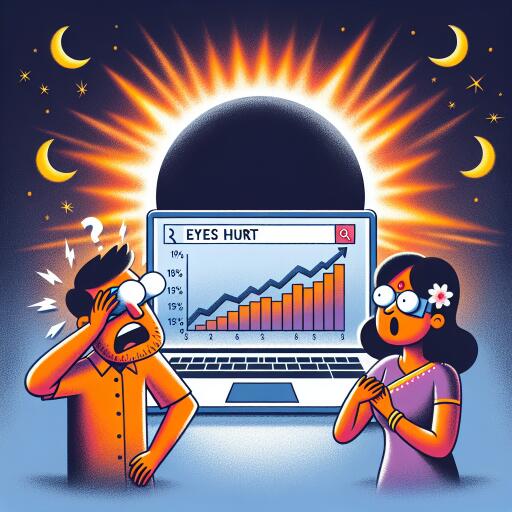Soaring Searches for Eye Discomfort Coincide with Solar Eclipse Phenomenon
In the wake of a breathtaking solar eclipse that captivated viewers across the United States, a curious trend emerged on the digital horizon. It appears many were left rubbing their eyes and turning to Google with concerns about sudden eye discomfort. Amid this celestial spectacle, queries like “eyes hurt,” “my eyes hurt,” and “why do my eyes hurt” surged dramatically, painting a vivid picture of the aftermath of eclipse overindulgence.
The allure of witnessing the moon’s shadow dance across the earth tempted countless individuals to cast their gazes skyward, despite widespread warnings about the dangers of direct sun viewing. The spike in eye discomfort-related searches reached its peak around the time the moon began its passage in front of the sun, with notable increases recorded at 11 a.m. PT/2 p.m. ET. This timing aligns closely with the eclipse’s trajectory, further linking these searches to the event.
Amidst this digital outpour of concern, other notable search inquiries arose including “can I look at the sun,” “solar eclipse pain,” and “solar eclipse no glasses.” The phenomenon also made a splash on social media, where users humorously shared their eclipse viewing experiences and the not-so-funny consequences of neglecting proper eye protection.
Examining the geographical distribution of these queries offers additional insights. States like Maine, Rhode Island, Pennsylvania, West Virginia, Indiana, Arkansas, and Texas led the charge in eye pain searches, coincidentally aligning with the eclipse’s path. This geographic trend underscores the widespread intrigue and potential disregard for safety recommendations during the event.
As the 2024 solar eclipse becomes a memory, it serves as a stark reminder of the importance of eye safety during such astronomical events. With the next significant solar eclipse not expected until August 23, 2044, one can only hope that lessons have been learned regarding the risks of direct sunlight exposure. Until then, this event will remain a cautionary tale about the delicate balance between human curiosity and the inherent dangers of nature’s wonders.









